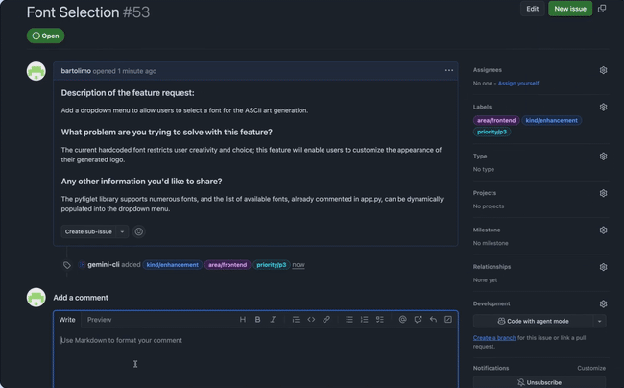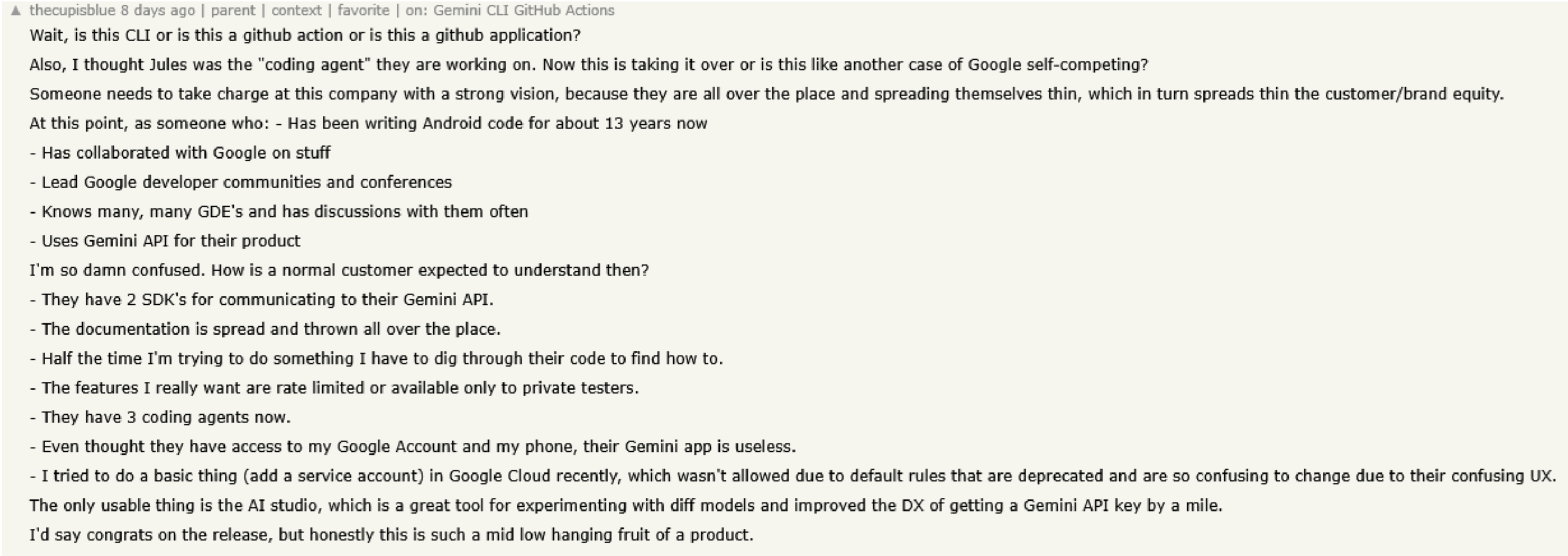
28 Aug 20259 minute read

28 Aug 20259 minute read

Google is taking its Gemini AI out of the terminal and into the repository, with a new GitHub Actions integration that lets the model triage issues, review pull requests, and act as a collaborative coding agent.
The internet giant debuted Gemini CLI back in June as a free, open source command-line tool that brought its flagship Gemini large language model (LLM) directly to the developer’s terminal. Want to generate code, debug errors, or query a repo? Enter Gemini CLI.
With Gemini CLI GitHub Actions, developers can now wire the model directly into their workflows, turning routine repo chores into automated tasks.
Available now in beta, Gemini CLI GitHub Actions shows how Google is pushing Gemini as part of core development infrastructure, moving beyond a standalone command-line tool. In its initial guise, the GitHub integration supports three core workflows, including:
Issue triage: Gemini can take the first past at new tickets, grouping duplicates, flagging bugs, and tagging enhancements so that developers aren’t stuck wading through a messy backlog.
Pull request reviews: instead of waiting for a colleague, Gemini can serve developers with real-time checks on quality, correctness, and style, letting human reviewers focus on bigger-picture design and intent.
On-demand support: Tagging @gemini-cli in a comment is akin to @-mentioning a teammate in a pull request or issue thread. Gemini can draft a unit test, sketch a fix, or draw up a plan and implement a feature.

The three starter workflows are bundled with the main Gemini CLI GitHub Actions repo, and developers can copy the sample YAML files into their own .github/workflows/ directory.
From there, everything is configurable: users can decide which events trigger Gemini (e.g. new issues, PRs, or @mentions), change the prompts it responds to, adjust labeling rules or priorities, or extend the workflow with their own steps alongside the Action. In practice, that means that teams could tweak the triage workflow to apply their own label taxonomy, tailor the PR review prompts to match internal coding standards, or set @gemini-cli to run only in specific branches.
The community response so far has generally been positive, after all, Google is offering something fairly alluring: a powerful AI agent that’s (currently) free to use, with generous limits and fully open source.
John Capobianco, YouTuber, “AI enthusiast,” and head of developer relations at Selector, went hands-on with the new GitHub Actions integration, calling it “really, really, cool,” noting that it could save maintainers huge amounts of time by automating triage, PR reviews, and code edits.
“I have over 200 GitHub repositories – maybe 250,” he said. “For me to track issues is a significant amount of my time. In fact, I try to do it every couple weeks – on the weekend, just catch up on my GitHub issues on all my repositories. If I could have them \[issues\] tagged and dealt with in a certain way….”
Put another way, even basic automation of labeling and triaging issues could free users from hours of manual housekeeping across sprawling sets of repos.
Capobianco’s demo wasn’t entirely smooth, however. Running on Windows Subsystem for Linux introduced browser errors during setup, and some of the example YAML workflows didn’t work out of the box. He had to “tweak the YAML files a little bit,” and even saw runs fail due to special character handling.
Still, he brushed these off as expected for an early release: “To be clear, this is beta, and it's new, and I'm totally fine with these little hiccups,” he said.
Elsewhere, some in the community voiced frustration at what they see as Google’s lack of focus in its AI tooling. One developer, who says they have been writing Android code for over a decade, and has led Google developer communities, says they are “so damn confused” at the proliferation of overlapping SDKs, scattered documentation, and various coding agents with unclear boundaries.
“Wait, is this CLI, or is this a github action, or is this a github application?,” the user wrote. “Also, I thought Jules was the ‘coding agent’ they are working on. Now this is taking it over, or is this like another case of Google self-competing?”
The answer is, of course, that Gemini CLI GitHub Actions isn’t a new agent, but the existing Gemini CLI running inside GitHub workflows. However, this highlights how overlapping products and unclear branding can make Google’s tools feel more like competing experiments than a coherent product line.

For context, Google also recently launched Jules, an “asynchronous coding agent” that clones a repository into a secure Google Cloud VM, and autonomously tackles tasks like writing tests, fixing bugs, or bumping dependencies before opening a pull request for review.
And Google maintains separate SDKs for working with Gemini: the Google Gen AI SDK, which provides a unified interface across both the Gemini Developer API and Vertex AI; and the Vertex AI SDK, which is part of Google’s broader Vertex AI client library and is aimed at production workflows, giving developers higher-level control over tasks like model training, deployment, and integration with the rest of Vertex AI services.
Others in the community agreed about the muddled product boundaries, suggesting that the underlying issue is that Google hasn’t drawn a clear line between its research culture and its product culture, leaving developers to feel like test subjects in overlapping experiments rather than customers of a cogent toolset.

Developers signing in with a personal Google account get a free Gemini Code Assist license for the CLI preview, which unlocks Gemini 2.5 Pro with a \~1M-token context and a ceiling of 60 requests per minute or 1,000 per day. Teams that need higher throughput or enterprise features can upgrade to Code Assist Standard or Enterprise, or use AI Studio or Vertex AI on usage-based billing.
In practice, this means that all of this costs nothing, until, that is, the user outgrows the fairly generous free allotment. How long generosity lasts after the initial preview period isn’t clear. Still, as Stability AI co-founder Emad Mostaque noted when Google debuted Gemini CLI back in June, Google’s infrastructure and scale position it to “absorb losses” and push GenAI costs down, putting real pressure on rivals.
Indeed, Google is not alone in chasing “agentic” developer tools. GitHub itself recently unveiled Copilot coding agent, which can be assigned issues and will spin up a GitHub Action to make changes and open draft pull requests. OpenAI, meanwhile, has split Codex into two tracks: a new Codex CLI for terminal-first workflows, and a cloud-based Codex agent inside ChatGPT that can connect to GitHub and clone repositories, make multi-file edits, run tests, and open pull requests from a sandboxed environment.
Where Google diverges is in its delivery model. With Gemini CLI GitHub Actions, it is embedding its agent directly into GitHub workflows as an open source Action developers can customize, rather than packaging it as a subscription add-on or proprietary cloud service. That allows teams to drop Gemini into their repos with minimal setup, tailor how it responds to issues or pull requests, and only pay if their usage exceeds the free API quota.

18 Jul 2025

14 Aug 2025

25 Apr 2025

29 Jul 2025

27 May 2025